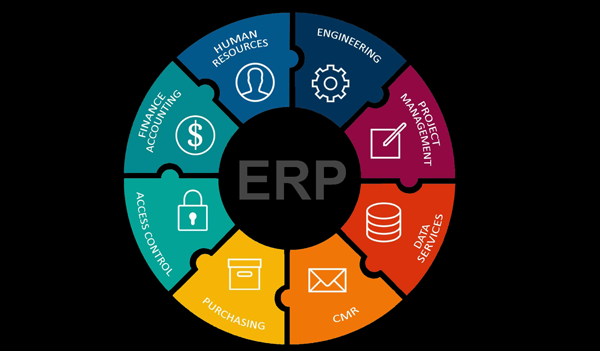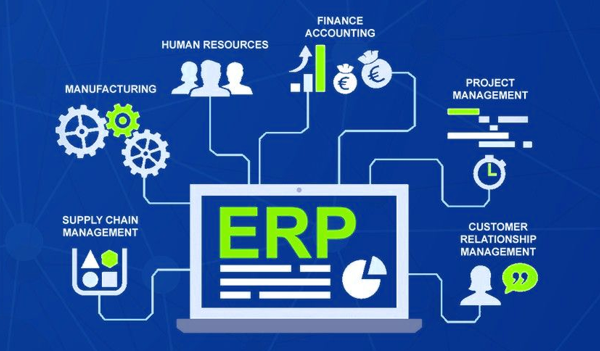Explore the top ERP solutions reshaping the business landscape. From SAP and Oracle to Microsoft Dynamics and NetSuite, dive into the features and benefits of the best ERP systems. Discover how these solutions streamline operations, provide real-time insights, and empower businesses for growth. Elevate your enterprise with the ultimate guide to the best ERP solutions in the digital era.
What is ERP?

Unraveling the ERP Magic
Enterprise Resource Planning (ERP) is more than just software; it’s a comprehensive suite of applications designed to streamline and integrate various business processes. From financial management and human resources to supply chain and customer relationship management, ERP solutions serve as the digital backbone for organizations seeking a unified and efficient approach to managing their operations.
Exploring the 15 Best ERP Solutions

1. SAP ERP
What It Is: SAP ERP is a robust and widely-used ERP solution that integrates various business processes, providing real-time insights and analytics.
Why It Stands Out: Known for its scalability and comprehensive features, SAP ERP is a preferred choice for large enterprises seeking end-to-end business management.
2. Oracle ERP Cloud
What It Is: Oracle ERP Cloud is a cloud-based solution offering a suite of applications for financial management, procurement, project management, and more.
Why It Stands Out: With its cloud-based architecture, Oracle ERP Cloud provides flexibility, scalability, and real-time collaboration.
3. Microsoft Dynamics 365
What It Is: Microsoft Dynamics 365 is an integrated suite of business applications that includes modules for sales, marketing, finance, and operations.
Why It Stands Out: Seamless integration with Microsoft’s ecosystem, user-friendly interface, and AI-driven insights make it a compelling choice.
4. NetSuite ERP
What It Is: NetSuite ERP is a cloud-based solution encompassing financial management, supply chain, and customer relationship management.
Why It Stands Out: NetSuite ERP offers unified business management, scalability, and real-time visibility, making it ideal for businesses of all sizes.
5. Epicor ERP
What It Is: Epicor ERP is known for its industry-specific solutions, providing comprehensive tools for manufacturing, distribution, retail, and more.
Why It Stands Out: Tailored for specific industries, Epicor ERP ensures a precise fit for diverse business needs.
6. Infor CloudSuite
What It Is: Infor CloudSuite is a cloud-based ERP solution offering industry-specific features for sectors like manufacturing, healthcare, and hospitality.
Why It Stands Out: Industry specialization, user-friendly interface, and scalability make Infor CloudSuite a strong contender.
7. Sage Intacct
What It Is: Sage Intacct is a cloud-based financial management solution known for its focus on accounting and financial reporting.
Why It Stands Out: Ideal for small to mid-sized businesses, Sage Intacct offers robust financial tools and easy scalability.
8. Workday ERP
What It Is: Workday ERP is a cloud-based solution primarily focused on human resources, financial management, and analytics.
Why It Stands Out: Workday ERP is praised for its intuitive interface, mobile capabilities, and emphasis on people-centric processes.
9. IFS Applications
What It Is: IFS Applications is an ERP solution with a strong focus on industries like manufacturing, construction, and aerospace.
Why It Stands Out: IFS Applications excels in providing industry-specific solutions, fostering efficiency and agility.
10. Acumatica Cloud ERP
What It Is: Acumatica Cloud ERP is a cloud-based solution known for its flexibility, offering modules for financials, distribution, and project accounting.
Why It Stands Out: Its adaptable architecture and comprehensive features make Acumatica Cloud ERP suitable for various industries.
11. Syspro ERP
What It Is: Syspro ERP is an industry-specific solution catering to manufacturing and distribution businesses.
Why It Stands Out: Known for its focus on process manufacturing, Syspro ERP provides tools for effective production management.
12. Ramco ERP
What It Is: Ramco ERP is a cloud-based solution offering modules for finance, HR, supply chain, and manufacturing.
Why It Stands Out: With its advanced features like chatbots and AI-driven insights, Ramco ERP brings innovation to traditional ERP processes.
13. Unit4 ERP
What It Is: Unit4 ERP is known for its focus on people-centric processes, offering modules for finance, HR, and project management.
Why It Stands Out: Unit4 ERP prioritizes user experience, flexibility, and adaptability to changing business needs.
14. Deltek ERP
What It Is: Deltek ERP is designed for project-based businesses, offering tools for project management, resource planning, and financials.
Why It Stands Out: Deltek ERP is ideal for businesses in industries like architecture, engineering, and consulting, providing tailored solutions.
15. QAD ERP
What It Is: QAD ERP is a solution tailored for manufacturing businesses, offering tools for production planning, supply chain, and quality management.
Why It Stands Out: QAD ERP is distinguished by its focus on manufacturing excellence, providing tools for efficient production processes.
Why Your Business Needs an ERP Solution
1. Streamlined Operations
ERP solutions streamline operations by centralizing data and processes, reducing manual work, and eliminating silos between departments.
2. Real-time Visibility
Access to real-time data and insights empowers businesses to make informed decisions promptly, fostering agility and responsiveness.
3. Improved Collaboration
ERP solutions enhance collaboration by providing a unified platform where teams can share information and work together seamlessly.
4. Scalability for Growth
As your business grows, an ERP solution adapts to changing needs, ensuring that your processes remain efficient and aligned with your goals.
Choosing the Right ERP Solution: A Guide
1. Assessing Business Needs
Understand your business processes, pain points, and goals. This assessment forms the foundation for choosing an ERP solution that aligns with your unique requirements.
2. Scalability and Flexibility
Choose an ERP solution that can scale with your business and adapt to evolving industry trends. Flexibility ensures that the solution remains relevant in dynamic business environments.
3. Integration Capabilities
Consider the integration capabilities of an ERP solution, especially if you have existing systems. Seamless integration ensures a smooth transition and minimizes disruptions.
4. User-Friendly Interface
An intuitive and user-friendly interface is crucial for user adoption. Choose an ERP solution that minimizes the learning curve for your team.
Challenges and Solutions in ERP Implementation
1. Data Migration Challenges
Data migration can be complex during ERP implementation. Plan meticulously, clean your data, and leverage migration tools provided by ERP vendors.
2. Resistance to Change
Employees may resist changes introduced by ERP implementation. Address this through comprehensive training, communication, and emphasizing the benefits of the new system.
3. Selecting the Right Implementation Partner
Choosing the right implementation partner is crucial. Look for partners with experience in your industry, a proven track record, and a commitment to ongoing support.
Realizing the Benefits: Success Stories of ERP Implementation
Company A: Transforming Financial Management
Company A implemented SAP ERP to transform its financial management. The platform streamlined accounting processes, provided real-time financial insights, and improved compliance. As a result, Company A experienced enhanced financial accuracy and efficiency.
Company B: Unifying Operations with Microsoft Dynamics 365
For Company B, a mid-sized manufacturing business, implementing Microsoft Dynamics 365 unified its operations. The platform’s integration with existing Microsoft tools, along with its user-friendly interface, resulted in improved collaboration and streamlined processes.
The Future of ERP: Trends and Exciting Innovations
1. Artificial Intelligence (AI) Integration
The integration of AI into ERP is on the horizon. This promises to enhance predictive analytics, automate routine tasks, and provide businesses with intelligent insights for better decision-making.
2. Enhanced User Experience and Mobility
As mobile devices become integral to business operations, ERP solutions are evolving to offer enhanced mobility. This includes intuitive mobile applications that empower users to manage tasks, access critical information, and make decisions on the go.
3. Deeper Industry-Specific Solutions
ERP vendors are committed to providing deeper industry-specific solutions. The future holds more tailored features and modules to meet the unique needs of various industries, ensuring a more personalized experience for businesses.
Conclusion: Setting Sail with the Right ERP Solution
In the vast ocean of business possibilities, choosing the right ERP solution is akin to setting sail with a reliable navigator. It’s not just about managing processes; it’s about orchestrating efficiency, fostering growth, and adapting to the ever-changing business currents.
Whether you’re a startup dreaming big or an established enterprise aiming for digital excellence, the right ERP solution is your strategic companion. Streamline your operations, gain real-time insights, and navigate the future with the transformative power of ERP. It’s time to set sail towards new horizons of business success!
Read Also:
- MRP Software
- Epicor ERP
- NetSuite ERP
- Manufacturing Software
- Construction ERP
- Acumatica ERP
- Online ERP